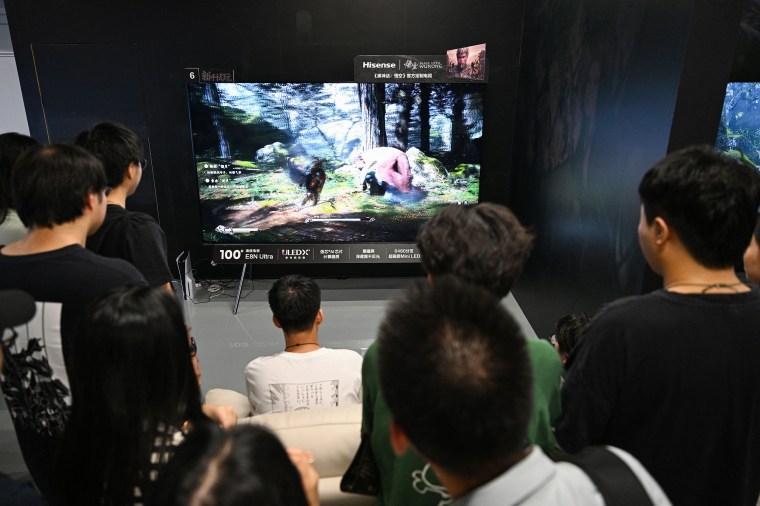Internet goes wild for Chinese video game even as reviewers bash censorship
HONG KONG — A newly released video game from China topped charts worldwide on Wednesday, in what was celebrated as a breakthrough for the global projection of Chinese culture even as overseas players raised concerns about censorship during the game’s promotion.
Loosely inspired by the 16th-century Chinese classical epic “Journey to the West,” the action role-playing game “Black Myth: Wukong” has become a gaming sensation, drawing acclaim both at home and abroad for its stunning visuals and portrayal of Chinese culture and mythology. Its developer, Game Science, is backed by the Chinese technology giant Tencent, China’s biggest video game publisher.
Players wake up in the game as a magical ape that can shapeshift into other animals as well as human-like characters. They then set off on an arduous journey during which they combat monsters and discover the six relics of Wukong, or the Monkey King, that enhance the character’s different powers.
Within hours of its release on Tuesday, “Black Myth: Wukong” was topping worldwide sales on Steam, an online distribution platform where the game can be downloaded and played starting at $59.99. At its peak on Wednesday, it was being played concurrently by 2.2 million people, more than any other game on the platform.
Experts say the much-anticipated game, which generated tens of millions of dollars in presales, is a watershed moment for China’s gaming industry, which historically has been plagued with regulatory challenges and policy changes that limit game time and in-game purchases for some players, as authorities try to combat gaming addiction especially among young people.
But it had already stirred controversy before its release, as high-profile game reviewers given advance access reported they had been instructed not to talk about certain topics while livestreaming the game.
A Google Doc provided to them by Hero Games, the Beijing-based company responsible for the game’s marketing, listed one “Do” (“Enjoy the game!”) and a number of “Don’ts.”
They included using “trigger words” such as “quarantine,” “isolation” and “Covid-19,” as well as discussing politics, “feminist propaganda” and “other content that instigates negative discourse.”
The Covid-19 pandemic remains a sensitive topic in China, where mass protests broke out in late 2022 over the ruling Chinese Communist Party’s stringent “zero-Covid” restrictions. The government has also been cracking down on efforts to promote women’s rights.
The reviewers were also asked not to discuss China’s gaming industry policies.
“That’s not normal,” said Benoit Reinier, a prominent French gaming YouTuber and journalist who goes by the name Ex Serv.
The campaign guidelines were shared with Reinier and others as a condition for receiving a virtual key to download the game early.
“By using the game key and creating content, you acknowledge that you have been informed of the following guidelines, and any statements made are your own and not related to our marketing team,” read an email to Reinier from a Hero Games representative that was dated Saturday and seen by NBC News.
“Seeing a studio sending recommendations through a PR agency to avoid ‘negative discourse’ is a big red flag to me,” Reinier told NBC News in an email.
Game Science and Hero Games did not respond to requests for comment.

“Black Myth: Wukong” is considered China’s first “AAA” game, a classification used to describe high-budget and high-profile games that are often dubbed blockbusters.
Although mobile games such as Genshin Impact have gained global popularity in recent years, Chinese game developers had yet to see true console and PC success.
“Regulatory uncertainty has always been an overhang,” said Ivan Su, a Hong Kong-based senior equities analyst at Morningstar.
But recently, he said, “the Chinese gaming studios have obviously stepped up their game.”
The game’s success was celebrated by Chinese state media, which described it as a “cross-cultural bridge.”
“Chinese players in the past have gone through this process of cross-cultural understanding, now it is the turn of overseas players to learn… and understand Chinese traditional culture,” CCTV, China’s state-run broadcaster, said in a blog post Wednesday on its WeChat account.
In a sign of the government’s enthusiasm, CCTV highlighted the game in its nightly news broadcast on Tuesday, while Xinhua, China’s state-run news agency, published a 32-minute-long video interview with the developers.
“They don’t usually do these type of things,” Su said.
He said the state media coverage “suggests a lot about what the government attitude is on the sector. Things are definitely trending toward the right direction for the industry.”
Asked about the game on Wednesday, Chinese Foreign Affairs Ministry spokesperson Mao Ning said she was not aware of it but that its success “reflects the appeal of Chinese culture.”
The game is also a resounding hit on Chinese social media, where hashtags about it have gained more than 2 billion views on Weibo.
“You’ve ridden horses in the American West, been a pirate in Europe, a soldier on foreign battlefields, and an assassin in Egypt. Now you can finally return to your homeland and be your own hero,” one comment read.
“This is China’s soft power cultural export, and everyone should support it.”





